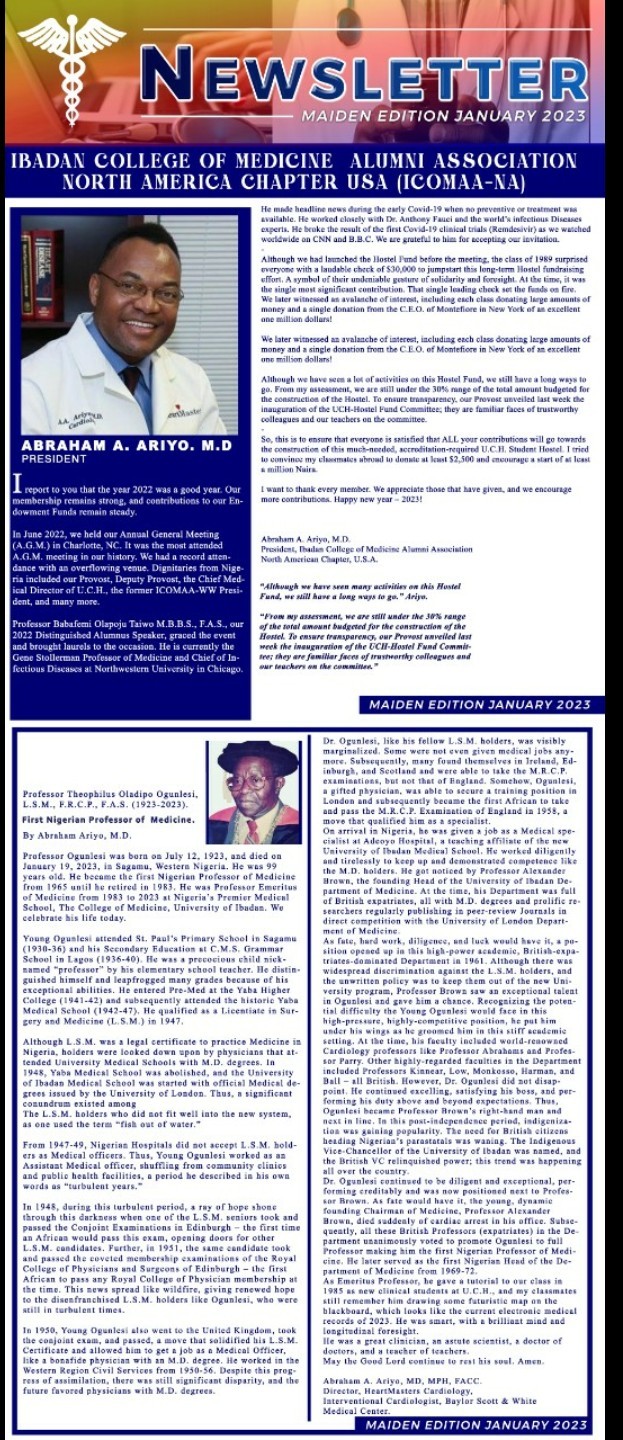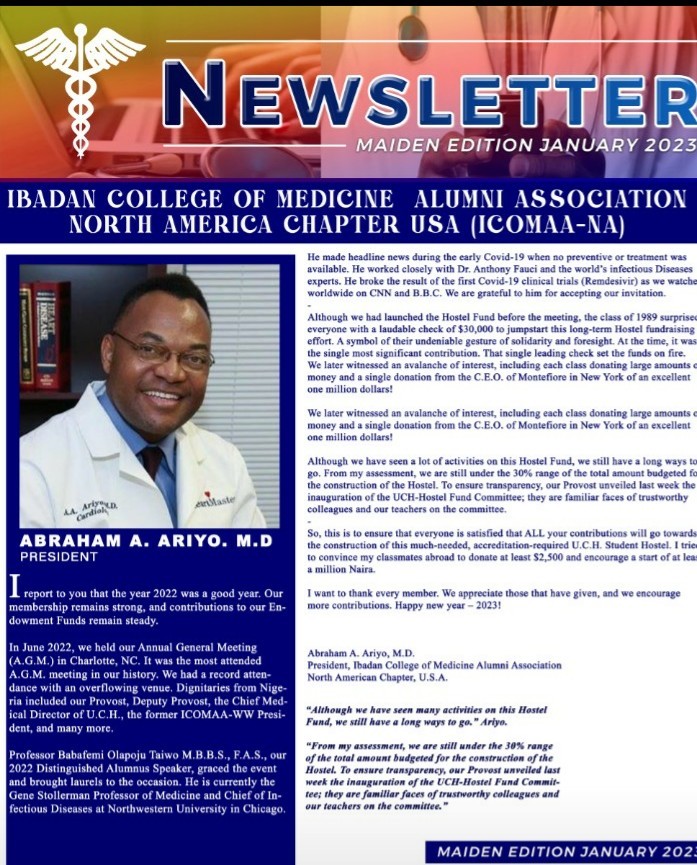MONTHLY NEWSLETTER FROM THE DESK OF ABRAHAM ARIYO, MD, MPH FACC PRESIDENT ICOMAA-NA TO THE WORLD OF MEDICINE
- 31 Jan, 2023
- 5119 views

ICOMAA-NA PRESIDENT’S SPEECH.
Welcome to 2023
"I want to thank every member. We appreciate those that have given, and we encourage more contributions. Happy New Year and welcome to 2023!" Abraham Ariyo MD.
I report to you that the year 2022 was a good year. Our membership remains strong, and contributions to our Endowment Funds remain steady.
In June 2022, we held our Annual General Meeting (A.G.M.) in Charlotte, NC. It was the most attended A.G.M. meeting in our history. We had a record attendance with an overflowing venue. Dignitaries from Nigeria included our Provost, Deputy Provost, the Chief Medical Director of U.C.H., the former ICOMAA-WW President, and many more.
Professor Babafemi Olapoju Taiwo M.B.B.S., F.A.S., our 2022 Distinguished Alumnus Speaker, graced the event and brought laurels to the occasion. He is currently the Gene Stollerman Professor of Medicine and Chief of Infectious Diseases at Northwestern University in Chicago.
He made headline news during the early Covid-19 when no preventive or treatment was available. He worked closely with Dr. Anthony Fauci and the world's infectious Diseases experts. He broke the result of the first Covid-19 clinical trials (Remdesivir) as we watched worldwide on CNN and B.B.C. We are grateful to him for accepting our invitation.
Although we had launched the Hostel Fund before the meeting, the class of 1989 surprised everyone with a laudable check of $30,000 to jumpstart this long-term Hostel fundraising effort; A symbol of their undeniable gesture of solidarity and foresight. At the time, it was the single most significant contribution. That single leading check set the funds on fire. We later witnessed an avalanche of interest, including each class donating large amounts of money and a single donation from the C.E.O. of Montefiore in New York of an excellent one million dollars.
Although we have seen many activities on this Hostel Fund, we still have a long ways to go. From my assessment, we are still under the 30% range of the total amount budgeted for the construction of the Hostel. To ensure transparency, our Provost unveiled last week the inauguration of the UCH-Hostel Fund Committee; they are familiar faces of trustworthy colleagues and our teachers on the committee.
So, this is to ensure that everyone is satisfied that ALL your contributions will go towards the construction of this much-needed, accreditation-required U.C.H. Student Hostel. I tried to convince my classmates abroad to donate at least $2,500 and encourage a start of, at least a million Naira.
I want to thank every member. We appreciate those that have given, and we encourage more contributions.
Happy New Year and welcome to 2023!
______________________________________
TRIBUTE: Professor Theophilus Oladipo Ogunlesi, L.S.M., F.R.C.P., F.A.S. (1923-2023).
Professor Ogunlesi was born on July 12, 1923 and died on the 19 of January, 2023, in Sagamu, Western Nigeria. He was 99 years old. He became the first Nigerian Professor of Medicine from 1965 until he retired in 1983. He was Professor Emeritus of Medicine from 1983 to 2023 at Nigeria's Premier Medical School, The College of Medicine, University of Ibadan. We celebrate his life today.
Young Ogunlesi attended St. Paul's Primary School in Sagamu (1930-36) and his Secondary Education at C.M.S. Grammar School in Lagos (1936-40). He was a precocious child nicknamed "professor" by his elementary school teacher. He distinguished himself and leapfrogged many grades because of his exceptional abilities. He entered Pre-Med at the Yaba Higher College (1941-42) and subsequently attended the historic Yaba Medical School (1942-47). He qualified as a Licentiate in Surgery and Medicine (L.S.M.) in 1947.
Prof. T. Oladipo Ogunlesi (late)
Although L.S.M. was a legal certificate to practice Medicine in Nigeria, holders were looked down upon by physicians that attended University Medical Schools with M.D. degrees. In 1948, Yaba Medical School was abolished, and the University of Ibadan Medical School was started with official Medical degrees issued by the University of London. Thus, a significant conundrum existed among the L.S.M. holders who did not fit well into the new system, as one used the term "fish out of water."
From 1947-49, Nigerian Hospitals did not accept L.S.M. holders as Medical officers. Thus, Young Ogunlesi worked as an Assistant Medical officer, shuffling from community clinics and public health facilities, a period he described in his own words as "turbulent years."
In 1948, during this turbulent period, a ray of hope shone through this darkness when one of the L.S.M. seniors took and passed the Conjoint Examinations in Edinburgh – the first time an African would pass this exam, opening doors for other L.S.M. candidates. Further, in 1951, the same candidate took and passed the coveted membership examinations of the Royal College of Physicians and Surgeons of Edinburgh - the first African to pass any Royal College of Physician membership at the time. This news spread like wildfire, giving renewed hope to the disenfranchised L.S.M. holders like Ogunlesi, who were still in turbulent times.
In 1950, Young Ogunlesi also went to the United Kingdom, took the conjoint exam, and passed, a move that solidified his L.S.M. Certificate and allowed him to get a job as a Medical Officer, like a bonafide physician with an M.D. degree. He worked in the Western Region Civil Services from 1950-56. Despite this progress of assimilation, there was still significant disparity, and the future favored physicians with M.D. degrees.
Dr. Ogunlesi, like his fellow L.S.M. holders, was visibly marginalized. Some were not even given medical jobs anymore. Subsequently, many found themselves in Ireland, Edinburgh, and Scotland and were able to take the M.R.C.P. examinations, but not that of England. Somehow, Ogunlesi, a gifted physician, was able to secure a training position in London and subsequently became the first African to take and pass the M.R.C.P. Examination of England in 1958, a move that qualified him as a specialist.
On arrival in Nigeria, he was given a job as a Medical specialist at Adeoyo Hospital, a teaching affiliate of the new University of Ibadan Medical School. He worked diligently and tirelessly to keep up and demonstrated competence like the M.D. holders. He got noticed by Professor Alexander Brown, the founding Head of the University of Ibadan Department of Medicine. At the time, his Department was full of British expatriates, all with M.D. degrees and prolific researchers regularly publishing in peer-review Journals in direct competition with the University of London Department of Medicine.
As fate, hard work, diligence, and luck would have it, a position opened up in this high-power academic, British-expatriates-dominated Department in 1961. Although there was widespread discrimination against the L.S.M. holders, and the unwritten policy was to keep them out of the new University program, Professor Brown saw an exceptional talent in Ogunlesi and gave him a chance. Recognizing the potential difficulty the Young Ogunlesi would face in this high-pressure, highly-competitive position, he put him under his wings as he groomed him in this stiff academic setting. At the time, his faculty included world-renowned Cardiology professors like Professor Abrahams and Professor Parry. Other highly-regarded faculties in the Department included Professors Kinnear, Low, Monkosso, Harman, and Ball - all British. However, Dr. Ogunlesi did not disappoint. He continued excelling, satisfying his boss, and performing his duty above and beyond expectations. Thus, Ogunlesi became Professor Brown's right-hand man and next in line. In this post-independence period, indigenization was gaining popularity. The need for British citizens heading Nigerian's parastatals was waning. The Indigenous Vice-Chancellor of the University of Ibadan was named, and the British VC relinquished power; this trend was happening all over the country.
Dr. Ogunlesi continued to be diligent and exceptional, performing creditably and was now positioned next to Professor Brown. As fate would have it, the young, dynamic founding Chairman of Medicine, Professor Alexander Brown, died suddenly of cardiac arrest in his office. Subsequently, all these British Professors (expatriates) in the Department unanimously voted to promote Ogunlesi to full Professor making him the first Nigerian Professor of Medicine. He later served as the first Nigerian Head of the Department of Medicine from 1969-72.
As Emeritus Professor, he gave a tutorial to our class in 1985 as new clinical students at U.C.H., and my classmates still remember him drawing some futuristic map on the blackboard, which looks like the current electronic medical records of 2023. He was smart, with a brilliant mind and longitudinal foresight.
He was a great clinician, an astute scientist, a doctor of doctors, and a teacher of teachers.
May the Good Lord continue to rest his soul. Amen.
_______________________________
HOW NIGERIANS CAN PREVENT HEART DISEASES .... Cardiologist- Healthwise
An interventional cardiologist, Dr. Abraham Ariyo, has advised Nigerians to embrace healthy diets to reduce the burden of cardiovascular diseases in the country.
Ariyo, Director, Heart Masters Cardiology in Dallas, Texas, United States, gave the advice in an interview with the News Agency of Nigeria on Tuesday in Lagos.
According to the Federal Ministry of Health, CVD is a significant public health concern responsible for 11 per cent of over two million non-communicable disease deaths in Nigeria annually.
It said that CVD was also responsible for a high burden of morbidity and disability, noting that, most people with CVDs were not aware until catastrophes like stroke, heart attack or death occurs.
Ariyo noted that Nigerians rarely have heart attacks in the past due to traditional meals that they had consumed, and an active lifestyle.
He, however, said that the consumption of processed and cholesterol-filled foods by Nigerians, especially in the urban areas was driving CVDs in the country.
“Many people in the western countries have realised the problem and are moving away from such kind of food to vegetarian, fresh food and less cholesterol-laden food.
“Nigerians are moving to where the western countries were, with their high consumption of fast foods like pizzas, hamburgers, and many cholesterol-filled foods,” he said.
He noted that the rise in sudden and unexplained deaths in Nigeria might be due to undetected cardiovascular diseases.
According to him, staying healthy is a personal responsibility and each individual should embrace it to live a long and healthy life.
Ariyo said the public needed to acquire basic life-support training skills, noting that it saves lives as it takes care of critical medical emergencies such as cardiac arrest management.
“Without immediate and appropriate attention, out-of-hospital cardiac arrest victims can lose their lives, while cardiopulmonary resuscitation (CPR) provides temporary assistance, and a defibrillator can help the individual survive sudden cardiac arrest.
“Defibrillators are devices that send an electric pulse or shock to the heart to restore a normal heartbeat,” he said.
Ariyo said ideally, a defibrillator should be available in public places to address emergencies, thus appealing to governments, NGOs and philanthropists to provide toward saving the lives of Nigerians.
NAN reports that Ariyo, is also the President, North America U.S. chapter of the Ibadan College of Medicine Alumni Association.
"He noted that each year, an American-based, Nigerian-born, team of heart specialists, which include interventional cardiologists, electro physiologists, nurses, and cardiac device companies from the US visit Nigeria for a week of marathon cardiovascular care.
Ariyo said that these visits made some medical practitioners return to Nigeria to practice and set up hospitals that perform up-to-date and complete cardiovascular care.
“This is the right step in the right direction with indigenous people starting to take non-governmental initiatives to increase health care capacity in Nigeria’s private sector,” he said.
He expressed optimism that collaboration among critical stakeholders would bring the solution to the numerous challenges affecting the healthcare sector of Nigeria.
(NAN)
==========================
Nigeria University Times, Monday, January 16, 2023
Ibadan College Of Medicine Alumni Association Calls For Support For UCH –Hostel Project
By Opeyemi Babalola
Ibadan College of Medicine Alumni Association (ICOMAA-NA), North America chapter, U.S.A has called on the alumni of the college across the world to give their monetary support for the completion of the University College Hospital hostel.
The ICOMAA North America, is a non-profit tax-exempt organisation that seeks funding from al alumni and friends, and from corporations and foundations from scholarships, endowments, capital improvement projects and medical equipment at the University of Ibadan College of Medicine.
The President of the Association, Abraham Ariyo, who made the call in his new year speech, commended the efforts of the Class of 1989 for donating a cheque of $30,000 to jump start this long-term fundraising effort.
He noted that since the donation, the alumni association has also received one million dollars from the CEO of Montefiore.
He said; “that single leading cheque set the funds on fire. We later witnessed an avalanche of interest, including each class donating large amounts of money and a single donation from the C.E.O. of Montefiore in New York of an excellent one million dollars.”
“Although we have seen a lot of activities on this Hostel fund, we still have a long way to go. From my assessment, we are still under the 30% range of the total amount budgeted for the construction of the Hostel. To ensure transparency, our Provost unveiled last week, the inauguration of the UCH-Hostel Fund Committee; they are familiar faces of trustworthy colleagues and our teachers on the committee.
“So, this is to ensure that everyone is satisfied that ALL your contributions will go towards the construction of this much-needed, accreditation required U.C.H. Student Hostel. I tried to convince my classmates abroad to donate at least, $2,500 and encourage a start of at least a million naira.”
- Category:
- Arts & Culture
- No comments



